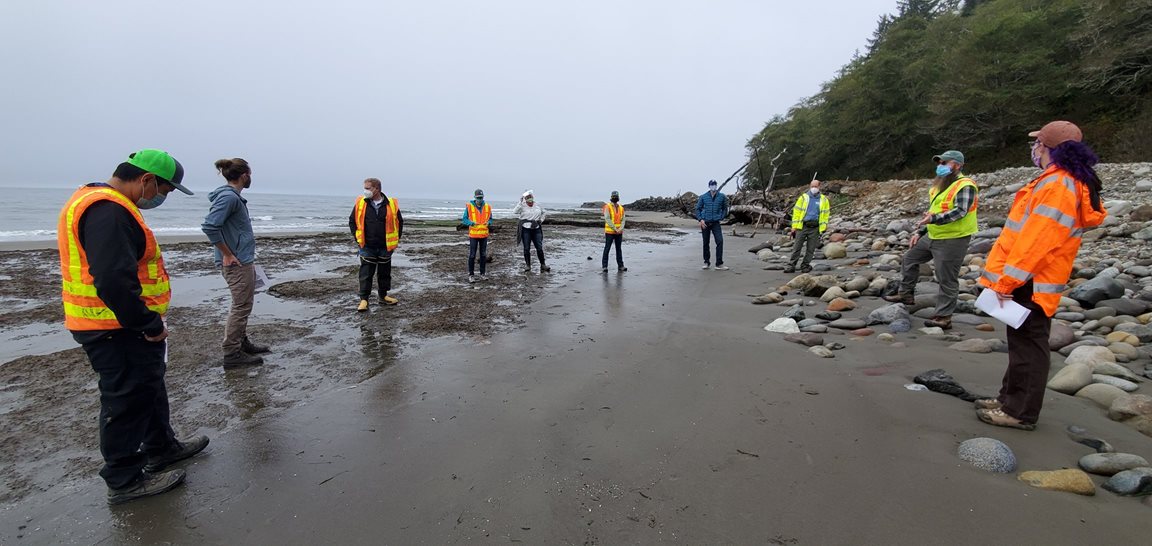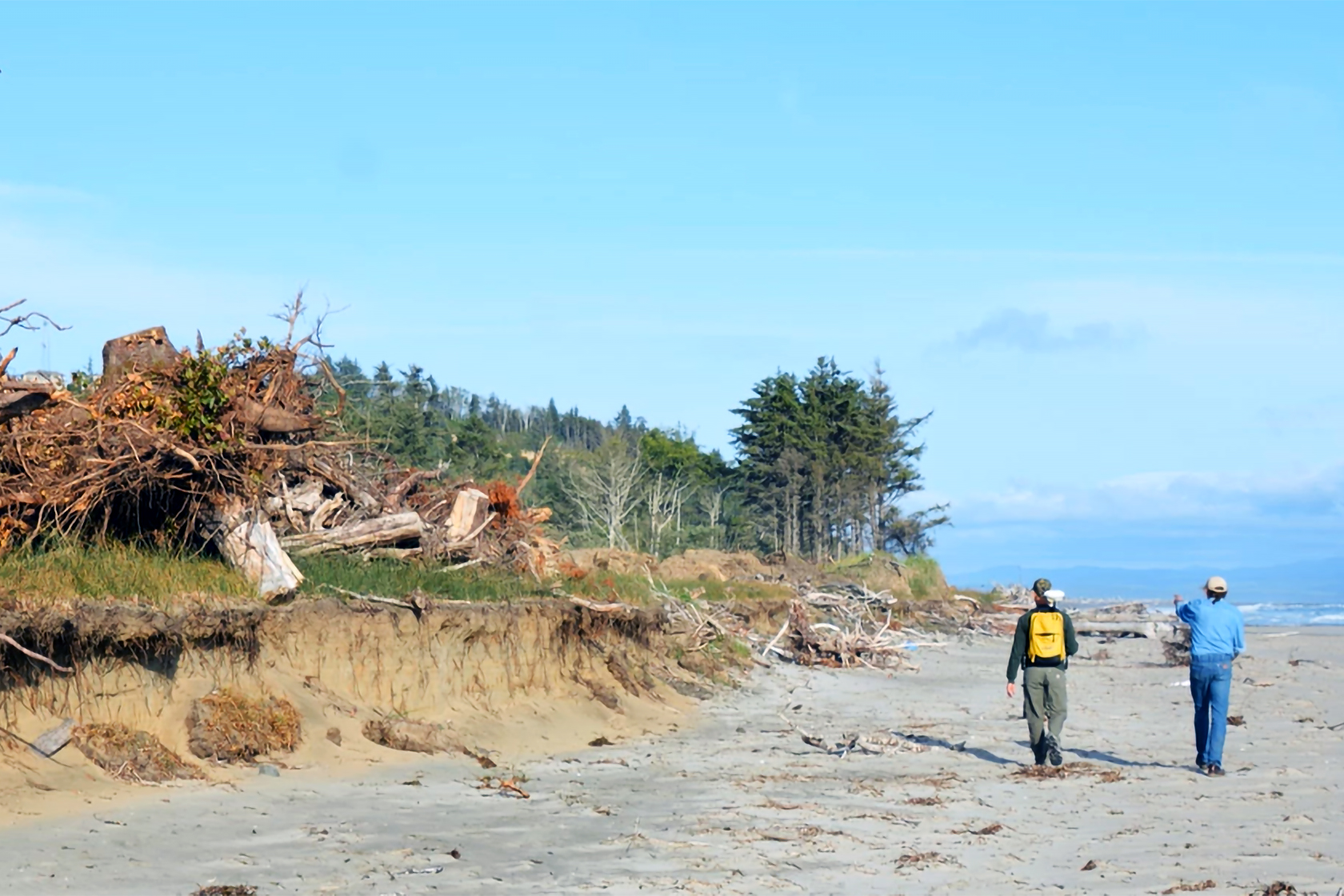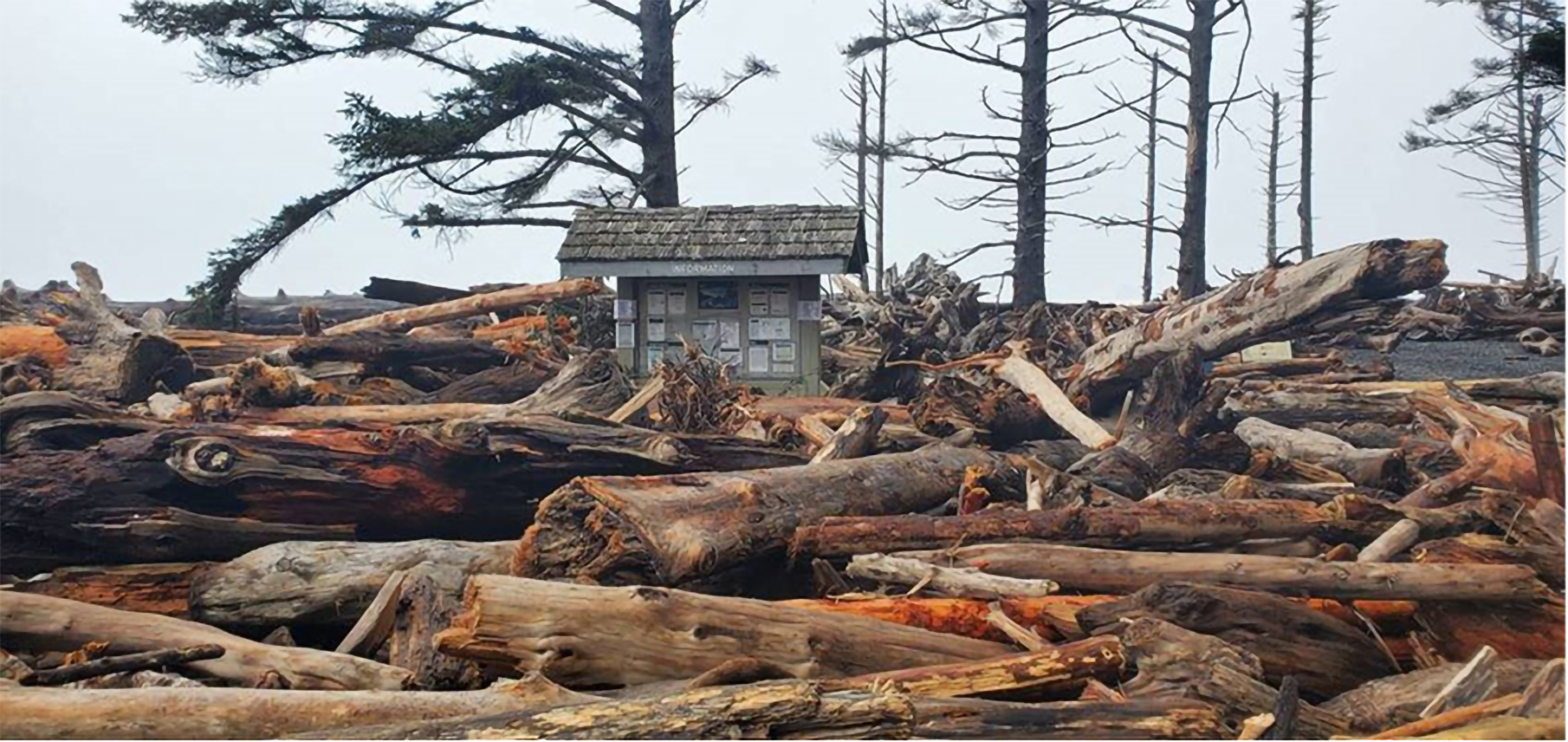
State and federal agency staff discuss a coastal hazards resilience project on the Willapa Bay shoreline. Photo courtesy Chelsey Martin, Washington State Department of Transportation.
Erosion. Floods. Sea level rise. Tsunamis. All of these natural hazards threaten Washington’s Pacific Ocean coast — with potentially dire consequences for coastal Tribes and communities.
Through the years, there have been a number of efforts and investments focused on responding to these coastal hazards. However, communities on the Pacific Coast often lack the resources to undertake comprehensive planning efforts designed to help them prepare for the hazards they face, and to plan on how they can recover quickly after a major incident occurs.
Erosion of banks, bluffs and beaches is a recurring issue along the coast.
Ecology and Washington Sea Grant recently led a partnership effort to complete the Resilience Action Demonstration Project to test different approaches to improve this type of planning. The two-year demonstration project included launching a multi-organization team made up of staff from state agencies and university extension programs to respond to urgent resilience needs identified by coastal communities.
“Coastal communities and Tribes are often geographically isolated and don’t have as many resources for resilience planning as bigger cities – yet they are even more vulnerable to natural hazards, especially in the face of climate change,” said Henry Bell, Ecology coastal planner. “Local communities are stretched so thin, they often can only respond to hazards issues as they arise. A coordinated agency assistance team has the potential to help communities overcome these capacity gaps.”
Building on 2017 assessment
The project directly responded to the coastal needs and priorities identified in the 2017 Washington Coast Resilience Assessment conducted by the William D. Ruckelshaus Center. With supplemental funding from the NOAA Office for Coastal Management, Ecology and Sea Grant were able to provide hands-on assistance to evaluate 175 potential projects and help secure $845,000 in federal funding for several resilience efforts in Washington.
Several projects getting underway
The Ecology-Sea Grant team worked with local, state, federal and non-profit partners to develop project proposals and find funding for several resilience projects that will soon be getting started, including:
- Securing Federal Emergency Management Agency (FEMA) funds for the Willapa Erosion Control Alliance Now community forum to develop a long-term plan to address chronic beach erosion in North Cove and Tokeland in Pacific County.
- Working with FEMA to secure funding for the city of Ocean Shores to assess and plan for chronic erosion in Oyhut Bay in Grays Harbor County.
- Acquiring National Fish and Wildlife Foundation funding to create a sea level rise resilience strategy for Baker and Grays bays. This work stems from an effort to address current and future flooding at the ports of Ilwaco and Chinook that threaten marinas and surrounding communities in Pacific County.
Needed: coastal resilience initiative
During winter months, extreme high tides regularly combine with storm surge to damage infrastructure and create safety hazards along Washington’s Pacific Coast.
The success of this pilot project demonstrates the long-term need for a coastal resilience initiative.
“A multi-organizational resilience assistance team would work in partnership with staff and community members on the Pacific coast to strengthen their social, economic and ecological resilience by providing strategic coordination and advancing projects that address both near-term priorities and long-term environmental changes,” said Jackson Blalock, Sea Grant community engagement specialist.
While the pilot project focused on Washington’s ocean coast, it has national relevance: Across the country, even when funding opportunities exist, many small communities do not have the capacity to secure funds for local projects that would improve their resilience to natural hazards.
This is an unprecedented time for federal investment in coastal resilience,” said Bobbak Talebi, Ecology senior coastal planner. “We have an important opportunity to help communities and Tribes leverage federal support to supplement the significant investments they are already making.”
Talebi added that the pilot project “helps demonstrate that by working collaboratively with these communities, we can strengthen partnerships and provide the extra capacity to develop project scopes, connect communities with funding programs, and help move projects off the shelf and onto the shore.”
Final report recommendations
This month, Ecology and Sea Grant released their joint recommendations from the demonstration project in a final report. The report recommends:
- Establishing a permanent multi-organizational resilience team
- Supporting local resilience planning.
- Creating local staff positions focused on building hazards resilience
- Increasing local access to funds
The Ecology-Sea Grant team is currently working with the Washington Coastal Marine Advisory Council and other state agencies and university extension programs to advance the report recommendations.
“The resilience of Washington’s coastal communities — the very safety, security and survival of our residents — depends on how well prepared we are for the increasing array of coastal hazards that we are facing,” said Washington Sea Grant Director Randall Callendar. “The demonstration project is a meaningful step forward in establishing this preparedness.”
About us
Ecology works to enhance Washington’s resilience to natural hazards in state coastal and shoreline areas through planning activities designed to avoid or minimize the impacts hazards can have on communities and natural resources. Ecology collaborates with communities, local and Tribal governments, and state and federal agencies to leverage information and resources to take action.
Washington Sea Grant helps people and marine life thrive by supplying research, technical expertise and educational activities that support the responsible use and conservation of ocean and coastal ecosystems.
For more information, contact:
Bobbak Talebi, Ecology senior coastal planner, 360-819-3014
Henry Bell, Ecology coastal planner, 360-628-2750



